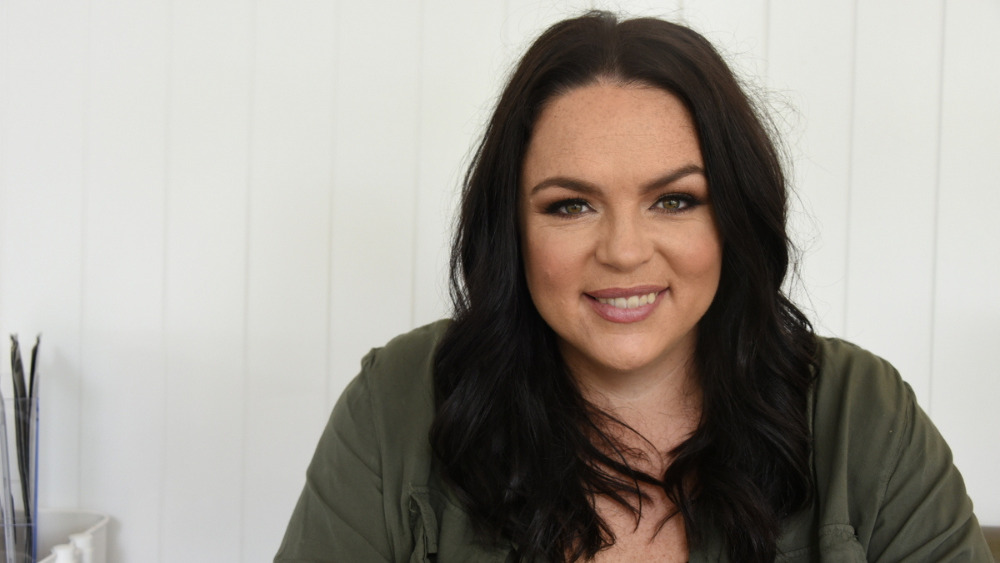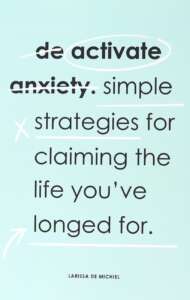A pastor's private battle with anxiety and panic attacks
Author Larissa De Michiel shares her story of overcoming anxiety.
The following article may be disturbing or triggering for some readers. It details sensitive topics relating to mental health and the impact of sexual abuse. We urge readers to seek appropriate support if needed.
Larissa De Michiel is a minister and a coach who is completing postgraduate studies in counselling. Her vibrant personality fills a room, and her sharp intelligence and deep spirituality are formidable in most settings. For the better part of her adult life, however, she has privately battled debilitating anxiety.
“There were two parts of me. I was a pastor. I was honest. I loved the church. I loved Jesus. I ministered and helped people. But my life was very narrow. Outside the narrow bounds of control and familiarity, if I went to the city, if I went to a movie theatre, if I did anything outdoors it would have brought on a severe panic attack. I couldn’t do any public transport, and aeroplanes were an agony of weeks of panic,” says Larissa.
This thing would overtake me. I would be so fearful and everything would get dark and my heart would race. I would think I was going to die. – Larissa De Michiel

Larissa De Michiel, author of the recently released book “Deactivate Anxiety.”
She details her experience of severe panic attacks with vivid clarity,
“I wake up in the morning, I work at church. I see the same people. I come home. Anything outside of that and this thing would overtake me. I would be so fearful and everything would get dark and my heart would race. I would think I was going to die. So many things could have triggered it, so my life was very controlled.”
The most terrifying thing in the early years of these experiences was that she did not know what was happening to her. Then she recounts that she “started having childhood memories come back around this sexual abuse with this adult in my life. At family get-togethers, I see him and there would be this major trauma, but I was never sure why because so many of those memories had been repressed.”

Having come from a fractured family background and complex childhood trauma, in her late teens, Larissa launched headfirst into a dark world of drugs and intense New Age spirituality.
“I was living out at a place called Devil’s Pinch, near Black Mountain. And as it was in the natural [the name of the place], so it was inside of me. I was living in a world of drugs and dealers. I couldn’t hold a job. I was having panic attacks every day. I was having these spiritual encounters, but they were very dark.”
The more she believed drugs and experimentation with New Age spirituality would bring her freedom, the more trapped she became. She knew that the spiritual world was real. She recalls thinking, “If there’s darkness in this spiritual world, there must be light, there must be holiness. Having no idea what journey I was about to go on.”
“God, if you’re real, if there’s this pure Holy Spirit that I’m missing, you are going to have to come to me because I can’t make my way to you.”
Her quest to find the light led to a profound encounter with Jesus one night in her bedroom,
“I was more surprised than anyone because I was so anti-Christian. I hated the church because of my family history. I remember with this surrendered heart going, God, if you’re real, if there’s this pure Holy Spirit that I’m missing, you are going to have to come to me because I can’t make my way to you.”
This powerful encounter radically changed the course of her life.
“There was this love and acceptance and understanding. This voice said Jesus Christ is the son of God. I realised that I’d been so wrong about Jesus.”
She left the environment she’d been living in and soon met beautiful Christians who began to teach her about Jesus and Christianity. “They took me in for a while, but I basically lived like a pilgrim for a few years. That started the most amazing adventure ever,” says Larissa.
“I know what I’ve done. I was dirty and nothing.”
Despite having personally experienced the love of God, Larissa continued to live for many years with a broken identity. Even as a Christian and later as a minister, she believed “that everyone else belonged, but I just got in by the skin of my teeth. I knew what I’d done. I was dirty and nothing.”
“I know now that I get to sit at a table and belong; it has nothing to do with me and everything to do with him,” she says.
Despite coming off drugs, her panic attacks and anxiety persisted. Larissa speaks in her book, Deactivate Anxiety, of her repressed childhood trauma, the inner child who she had shut away because she hated her so much.
When memories of her abuse began to surface in her 30s, Larissa began to investigate what was going on, and “it was like a volcano erupted,” she says.
“One night, a young man pulled a knife on me. It triggered what I now know was a panic attack that lasted for three months.”
At age 30, while working in youth residential care, “a young man pulled a knife on me. It triggered what I now know was a panic attack that lasted for three months. I couldn’t eat, and I couldn’t sleep. It was scary; I had no idea what had happened. I just knew I didn’t want to go back.”

To cope with the depth of darkness waiting to engulf her, she made her life narrower and more controlled than ever. For each Sunday that she was engaging with people, she needed three days at home to recover.
“At home, I was praying; I was with the Lord. I was just trying to manage and not go back to whatever that was,” she recounts.
“My beautiful baby was an uncontrollable variable in a life that was teetering on the edge of insanity.”
The birth of her first child shattered that fragile control, triggering the worst time of her life.
“Babies couldn’t give two hoots about our control or our routines. My beautiful baby was an uncontrollable variable in a life that was teetering on the edge of insanity.”
She recalls “one night looking at my three-week-old baby’s little face and knowing that there was this chaos that was just on the edge of exploding. The mental anguish, the panic was intense.”
Her traumatic past came crashing into her present reality and she was plunged into terrifying darkness.
“It was like I was that little girl again being abused by a pedophile. It was this world of terror. The slightest noise would cause me to violently throw up. I couldn’t sleep for months. My mum lived on and off with us for about 12 months. I would go in and out of the mental health clinic at the hospital. I would look at these people who were struggling and I just could see myself in them.”
Deeply demoralised, Larissa discovered that the only way forward was by looking at her past and the fragmented parts of herself she was still carrying around from the sexual abuse.
“I hated that little girl that was me. I hated me. But I had to begin looking at my past, to unravel the sexual abuse and to see it for what it really was and trust myself.”
“It was hard, but it became freeing and then it became empowering.”
Larissa notes that abuse at such a young age teaches you not to trust your gut feeling. For her, the panic attacks and anxiety were rooted in the abuse of her childhood.

“It was hard, but it became freeing and then it became empowering. I feel like I’ve learned some real tools that you can put in place to move forward from anxiety, suffering and pain.”
Larissa believes there are truths from God’s word that can be found in psychology, counselling and science. All these things can work together to bring restoration to the mind. Christians struggling with anxiety can and must seek out the support of mental health professionals alongside the truths of God’s word and prayer.
“God is the ultimate architect. Sometimes he’s got to do the scaffolding before he can deal with the seemingly obvious thing,” Larissa says.
“Sometimes it’s coming back to the basics of self-care – that’s the scaffold to build from. At some point, I realised that I was going to have to start looking at the abuse, but I just did it bit by bit.”
Looking back on her story, Larissa reflects that “you can walk out of this stuff that defined you for all these years.”
“They’re still part of your story, but you learn more about Jesus as a suffering servant, and you learn more about humanity. You learn more about Jesus’ ability to hold you in the deepest, darkest Gethsemane,” reflects Larissa.
She’s now working full-time in a job she loves. She ministers at her local church and in churches around the country. She’s studying. She travels on aeroplanes. She lives a full life.
“I can hold people’s pain in a way I couldn’t before. I still have moments, but it’s so minute in my life. I can honestly say this stuff is not the end of the story for me, and it doesn’t have to be for you. Christ can transform even the most painful of places,” she says.
Larissa’s prayer is that her story and her book will help to dispel misconceptions about anxiety. “That it means you don’t have enough faith. That it means that there must be sin in your life. That if you’re a Christian, you shouldn’t have it.”
She admits, “I was quiet about my struggles for a long time because I felt guilty for having them. I thought it was because I was not a good enough Christian. If I had really had faith, I would have the mind of Christ. If I really knew how to cast all my anxieties on the Lord, I would have his peace.”
“It requires, the spirit of God alive in us to be able to be with another in their pain. There’s just a lot of guilt put on people; ‘you should try harder, do more, read more’.”
For Larissa, anxiety was the fruit of some complex issues in her past. Slapping a Scripture on it was like putting a Band-aid on a deep festering wound. Her desire is to open a deeper, more holistic conversation about mental health in the church.
“There’s something about human nature that repels pain. It requires the spirit of God alive in us to be able to be with another in their pain. There’s just a lot of guilt put on people; ‘you should try harder, do more, read more’,” says Larissa.

“I have found, in the hardest times in my life, God is asking me to rest, lean back … The Lord would say, ‘That is right, my son, my daughter you have done all you can. Now let me.’ It requires the same response as when we first encountered him. It requires a heart of surrender,” she says.
Larissa’s encouragement to anyone struggling with their private pain is “with as much love as you can get through written words, I would say, surrender again, lean back, sit back and believe. Rest in the belief that he’s got you.” If you are in crisis or looking for ways to break patterns of anxiety and depression in your life, it’s essential to seek out mental health professionals who can support you in your journey.

You can purchase Deactivate Anxiety by Larissa De Michiel at Koorong, or Kindle.
The information provided in this article is intended to increase awareness of mental health issues and is not a substitute for professional mental health advice or treatment. If you need mental health support, please contact a trained mental health professional. To speak to a professional confidentially 24/7 you can contact Beyond Blue 1300 224 636, Lifeline chat 13 11 14 or Kids Helpline 1800 551 800, NSW Mental Health Line 1800 011 511 and Suicide Call Back Service 1300 659 467.
Email This Story
Why not send this to a friend?


